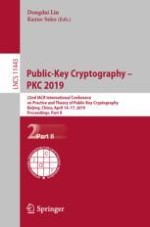2019 | OriginalPaper | Chapter
Decryption Failure Attacks on IND-CCA Secure Lattice-Based Schemes
Authors : Jan-Pieter D’Anvers, Qian Guo, Thomas Johansson, Alexander Nilsson, Frederik Vercauteren, Ingrid Verbauwhede
Published in: Public-Key Cryptography – PKC 2019
Publisher: Springer International Publishing
Activate our intelligent search to find suitable subject content or patents.
Select sections of text to find matching patents with Artificial Intelligence. powered by
Select sections of text to find additional relevant content using AI-assisted search. powered by
